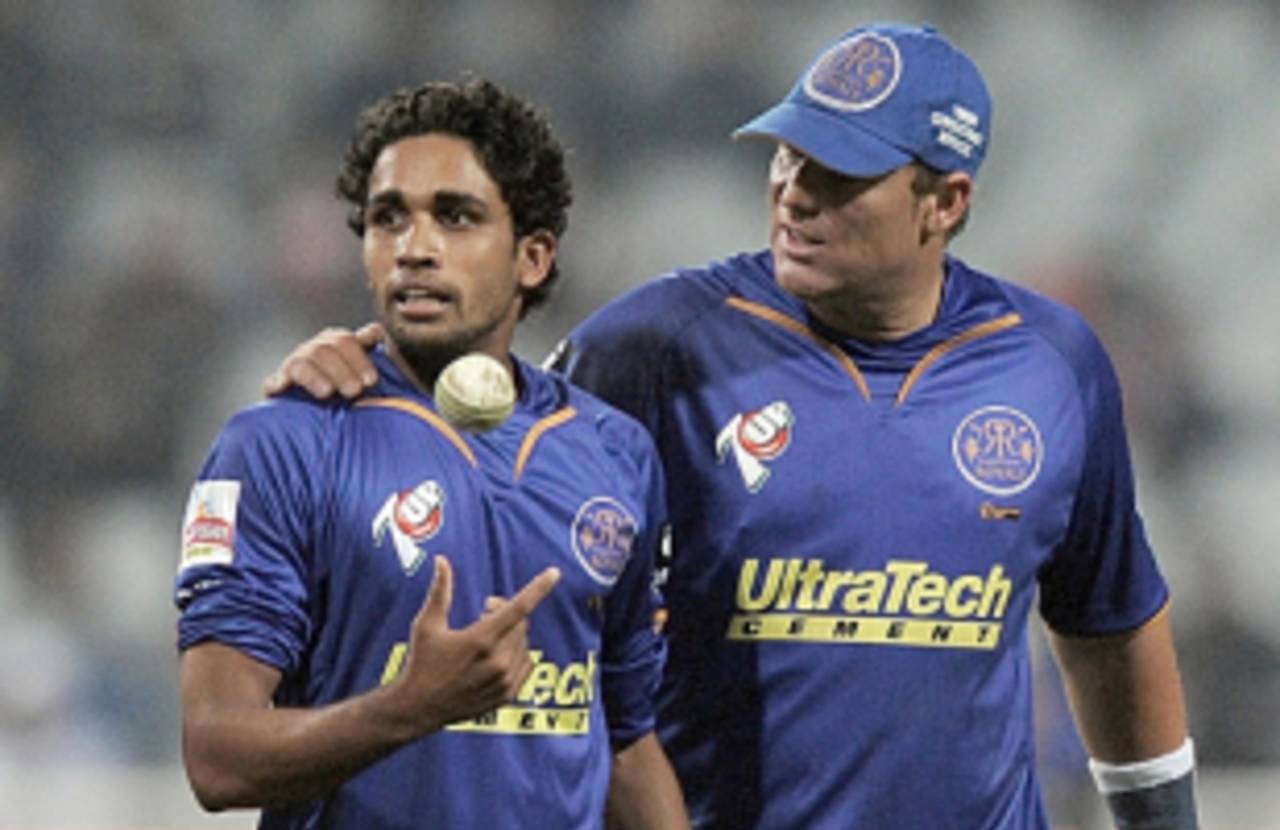The one-captain theory
The recent Super Over result illustrates just why having multiple leaders doesn't wash
26-Apr-2009

With a single, strong captain such as Warne, the team is in no confusion about where they stand • AFP
The game of cricket has an amazing capacity to voice an opinion in subtle ways. It did so in the frenetic confrontation that followed the first ever IPL tie.
The nail-biting finish resulted in a Super Over shootout between the Rajasthan Royals, the classic one-man-in-charge team, and the Kolkata Knight Riders, a side currently experimenting with the concept of multiple leaders. Not surprisingly, the mercurial Royals' captain, Shane Warne, opted for a daring ploy. He bowled a tyro in the drama-filled situation - Kamran Khan, who eventually prevailed over the Knight Riders' internationally acclaimed Ajantha Mendis.
It's worth pondering the machinations that led to Warne anointing Kamran to bowl the match-deciding over to a highly explosive Chris Gayle.
A good leader empowers his players; he endows them with the confidence to believe in their own ability and to be prepared to take a risk. When Warne opted to bowl Kamran for only one over in an IPL trial match in Cape Town (so as to not advertise the unorthodox slinger's attributes), he empowered his player. Here was a complete unknown being paid a huge compliment by his captain, one of the best bowlers the game has ever seen. If Warne correctly judged Kamran's temperament, he was assured of that extra effort from the tyro in an hour of need.
Before they reached the Super Over stage, Kamran had already repaid his skipper's faith by taking three wickets in the innings, including the crucial one of Sourav Ganguly in the final, desperate over. Having then been awarded the onerous task of bowling the Super Over, Kamran had two choices: to wilt or raise his game. Warne had seen something in his young bowler that led him to believe it would be the latter.
Compare that style of management with the Knight Riders', where they nominate a captain but extol the virtues of multiple leadership. In Kamran's case he knows he's been anointed by Warne, but Mendis could easily be wondering if he was chosen in a split vote by a committee.
Imagine the discussion in the Knight Rider's camp. First, Brendon McCullum asks Gayle: "Who do you think should bowl?" And then he asks Ganguly and Brad Hodge and anyone else who might either have been co-opted onto the committee or wandered past at the appropriate time and voiced an opinion.
At times of high tension on a cricket field the last thing a captain needs is to have his train of thought derailed by input from three co-captains
Eventually McCullum hands the ball to Mendis. After watching the consultation process Mendis is entitled to ask, as an Indian batsman once did when he was selected to replace an injured team-mate against an Australian Test side that included Jeff Thomson: "Why me?" Any doubts Mendis might have harboured about succeeding in such a pressure-cooker situation would have been elevated the moment he was handed the ball after a committee meeting.
Kamran on the other hand had already been empowered by Warne before the tournament started. Now here was his illustrious skipper maintaining his faith with a gesture that screamed loudly: "I believe you can win us this match."
Warne had the advantage of having already attained right royal miracle-worker status for Rajasthan. Once a team believes a captain can guide them home in a tight situation, there's a fair chance it'll become a self-fulfilling prophecy. Warne succeeds more often than not in tense situations because he's brave enough to seek victory rather than wait for it to come knocking on his door.
In the case of the Knight Riders' multiple-leadership experiment, the players aren't exactly sure who is putting faith in their ability. Is it McCullum alone or was it decided by a split vote?
At times of high tension on a cricket field the players look to the captain to show them a successful way through the fog. That calls for a clear and positive thinking leader. At such a crucial time the last thing a captain needs is to have his train of thought derailed by input from three co-captains.
The Super Over shootout emphasises the need for a team to have a strong-minded man in charge; one man. Or at least that's the way the cricket gods appeared to want it in Cape Town.